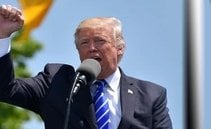Will the US-China Cold War get worse in 2024? There is a possibility of political and economic escalation, and at least 3 risks are associated with it. What reasons can exacerbate the tension between the two powers?

If the expression cold war still makes sense in 2024, the "credit" goes to the US-China rivalry.
2023 ended with a precarious and unconvincing détente between the two powers at odds over everything from technological dominance to commercial influence. The spy balloon crisis, the fight over semiconductors, the extension of duties and limits on the trade of rare earth and chip components, the intensification of military tension have made Beijing and Washington protagonists of international politics.
The year that has just begun could see a worsening of already heavily compromised relations, in a global context poised between ongoing wars and urgent economic challenges. According to various analyses, in fact, from presidential elections in Taiwan and the United States to the continuous commercial conflicts between the United States and China, Biden and Xi have a very complex task: to avoid an open war between the two powers. The risks that something goes wrong in 2024 are at least 3.
1. Taiwan
Taiwan’s presidential and legislative elections on January 13 are the first reason for high alert for US-China relations and world stability. How Beijing reacts could determine whether the relationship between the major global economies becomes filled with mutual suspicion.
Vice President Lai Ching-te and his deputy Hsiao Bi-khim of the ruling Democratic Progressive Party are leading in the polls. China fears them.
The elections on the island, which the dragon considers its territory, have repeatedly triggered tensions, particularly in 1996, when Chinese military exercises and missile tests before the vote prompted the United States to send a task force of aircraft carriers in the area.
This time Beijing has once again increased military and political pressure, framing the elections as a choice between “peace and war”, calling the ruling party a dangerous separatist, and urging Taiwanese to make the “right choice”.
According to rumors, Xi, hoping to avoid conflict, will moderate China’s military response if Lai wins. However, Taiwan remains on high alert for potential Chinese reactions, both military and political, ahead of the elections.
2. Trump at the White House
The 2024 US presidential elections could be even more impactful on the relationship between the US and China. Barring last-minute surprises, the vote should once again feature the clash between Biden and former president Donald Trump.
Rhetoric about China will not be lacking in the election speeches of both parties, but according to analysts, Xi will focus more on a specific question: will Trump return to office?
Tense US-China relations during former President Barack Obama’s tenure gave way to an all-out trade war under his successor, accusations over the origins of COVID-19, and new tensions over the status of Taiwan.
From a certain point of view, Trump’s return could represent a geopolitical advantage for China according to an analysis by Reuters. Biden has deftly increased pressure on Beijing, maintaining Trump-era tariffs, adding new export controls, and strengthening US alliances.
If Trump’s isolationist instincts mean a US withdrawal from alliances, this could be in the interests of China’s rulers, who feel surrounded by American power.
However, dissatisfied with Biden, Chinese politicians see him as a leader who acts within an institutional framework, managing to maintain the semi-functional US-China relationship. Trump, on the other hand, means unpredictability.
“When the Chinese think about next year’s elections, Trump’s return would be their worst nightmare”, commented Yun Sun, director of the Stimson Center in Washington.
3. Chip war
US export controls aimed at keeping the most advanced semiconductors out of China’s hands will likely only intensify next year.
Last October, the US tightened existing restrictions, blocking further high-end chips. Another update is likely in 2024: US Commerce Secretary Gina Raimondo said to expect one “at least once a year.”
While there is debate over how much export controls have prevented this technology from reaching China, Beijing has struggled to push back against these measures, especially because retaliation against U.S. businesses could drive away the foreign capital the dragon needs with the slowdown in economic growth.
One of Beijing’s levers is its dominant position as a supplier of rare earths needed for chip production. In July, for example, China disclosed export restrictions on certain gallium and germanium products.
The tension generated by US politics will only increase as US authorities crack down on violations of the new rules. The Biden administration launched a task force in 2023 to counter attempts to illegally acquire sensitive US technology.
Investigations into alleged violations involving technology exports to China are ongoing, and “we anticipate that these efforts will lead to significant export control actions in 2024 ”, the assistant secretary of commerce for China Matthew S. Axelrod said in a statement to Reuters.
Original article published on Money.it Italy 2024-01-03 12:59:55. Original title: Usa-Cina, lo scontro può peggiorare nel 2024. Ecco perché (i rischi sono 3)






